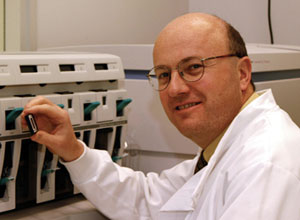UNITED KINGDOM SPOTLIGHT
Manchester: The North's Creative Capitol
Drive some 32 miles (51 km.) east on the M62 and you'll come upon Manchester, home of the Manchester United soccer team, a musical history that rivals Liverpool's with bands ranging from The Hollies to Oasis and Take That, and a thriving city in the midst of its own economic renaissance. The city was historically a center of textile manufacturing, but is now home to a sizeable life sciences industry and, depending on who you ask, either the second or third leading financial services sector in the U.K. behind London. The Bank of New York's regional headquarters is the most recent high-profile addition.
A decade ago, an Irish Republican Army bomb leveled a good portion of the city center. That explosive eventually set off a spate of government investment toward urban renewal that continues to spur economic development.
"The IRA bomb put Manchester on the government's plate," says Dr. Steve Toon, senior vice president at Medeval, a clinical trials specialist firm and a member of the city's growing life sciences community.
Nearly 100,000 students attend the city's four major universities, providing a steady flow of graduates ready to take jobs in the region's key sectors. The University of Manchester is the largest university in the U.K. The area stretching about two miles (3.2 km.) from the university to the city's public library is known as the Oxford Road Knowledge Corridor and is seen by public officials as a major growth catalyst. Late last year, Google opened its first U.K. regional office in this area, citing the city's creative reputation and its multiple universities.
 |
| Mark W.J. Ferguson is the CEO and co-founder of Renovo, one of the promising biopharmaceutical firms spun out of research at the University of Manchester. |
"We're 'Scars 'R Us,' jokes Mark W. J. Ferguson, Renovo's CEO and co-founder.
Renovo's potential market is huge: 42 million in the U.S. alone who suffer cuts, burns or other trauma. Ferguson says there are currently no marketed pharmaceuticals available in the U.S. or Europe to prevent or reduce scarring.
Ferguson describes Manchester as a dynamic city with good quality-of-life appeal. He says having the region's largest international airport is a major plus for business travel and attracting top personnel.
"We have very good access to talent here and it's easy to attract top-notch people," Ferguson says. "We average 200 applications for every opening. We sometimes lose people to AstraZeneca, but then we pinch people from AstraZeneca. Biotech is emerging here. We're not as large as Oxford or Cambridge, but we're probably a close third and growing."
Many of Manchester's technology companies get their start at the Manchester Science Park, home to nearly 100 companies in the life sciences and ICT fields at two locations encompassing 310,000 sq. ft. (28,800 sq. m.). Jane Davies, MSP's chief executive, says the city has a clear vision of where it's headed.
"Manchester is a viable alternative for high-tech businesses," Davies says. "There are a lot of sector specialties being developed here and a pool of talented knowledge workers with 28,000 university graduates available annually."
Manchester also has a diverse ICT and new media industry. One of its success stories is Idaho, a company so named because Mike Ryan, its managing director, wanted a catchy name that sounds big. Ryan describes Idaho's business as solving real-real world problems with Internet applications. The fast-growing company is involved with several major projects, including working with the BBC to develop innovative online content delivery.
Ryan is also company secretary for Manchester Digital, a new media trade association. He tallies Manchester's ICT and new media community at about 1,900 companies with about 90 percent of them being small firms of seven to eight people.
"There's vibrancy here," Ryan says. "Manchester is a magnet for energetic people."

